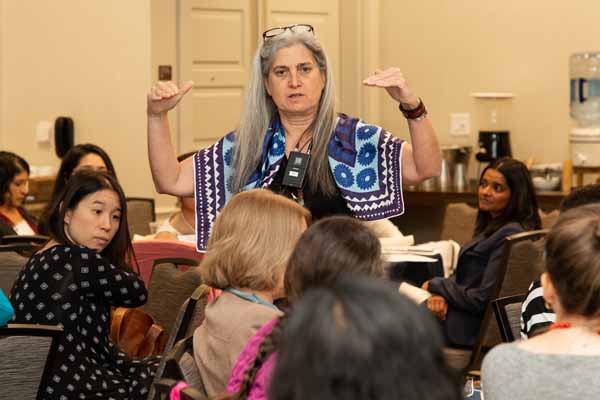
Robin Rather, CEO of the research firm Collective Strength, facilitated Saturday's luncheon.
More than 70 physicians attending the Women in Medicine Fall Conference Luncheon voted Saturday on a series of recommendations designed to help the Texas Medical Association better serve the needs of female members.
Numerous controversies at the national, state, and local levels have put a spotlight on the problems women face and the need for solutions, says Robin Rather, CEO of the research firm Collective Strength, who facilitated the discussion. The dialogue was designed to identify important issues affecting women in TMA and to bring proposed solutions quickly to the Board of Trustees for evaluation.
"We've never had a better moment, a better portal, to be heard as women in medicine," Ms. Rather said.
Participants discussed four recommendations for the board to consider:
- Create a watchdog function at TMA to identify discrimination and propose direct action.
Members looked over current TMA policies on nondiscrimination, comparing them with those of the American Medical Association and the American College of Physicians. TMA's policy broadly rejects discrimination on numerous grounds, including sex. However, as Jennifer Liedtke, MD, a family medicine specialist in Sweetwater, pointed out, TMA's policy provides no mechanism for follow-up or enforcement.
The group unanimously supported creating an administrative watchdog within TMA.
"[TMA's] policy says, ‘Yes, we don't want to discriminate.’ But you look at the AMA policy … and they're asked to analyze data and they're reporting to someone," Dr. Liedtke said. "Someone has got to be the watchdog over what is happening with women in medicine."
- Create a women's section within TMA.
The longest discussion centered on whether TMA should create a section specifically for women. TMA currently has four sections: medical students, international medical graduates, residents and fellows, and young physicians. Each section can provide input into TMA policy through direct access and representation within the TMA House of Delegates.
Most at the luncheon supported creating a women’s section while recognizing the need to maintain the trust of male colleagues. They say that is especially true because, given current trends, women could outnumber men within the TMA over time. While women currently make up 31 percent of TMA's membership, they make up 44 percent of resident membership. Also, data released earlier this year show that more women than men enrolled in Texas medical schools in 2017 for the first time in 14 years, an increase that reflects figures nationwide.
Susan Rudd Bailey, MD, speaker of the AMA House of Delegates and a past TMA president, says she has changed her view about creating a women's section over the years. At first, she opposed it because she feared it might leave women physicians pigeonholed or relegated to family issues. She also was apprehensive that a section might lead to having women in TMA viewed as women first and physicians second.
However, she now believes a women's section is the best way to improve their representation within TMA.
"I think one of the primary reasons for a section is not only to focus your interests and to have like-minded people who are interested in the same thing you are, [but to give] you a point of entry into the organization," Dr. Bailey said.
Lisa Ehrlich, MD, past president of the Harris County Medical Society, proposed a compromise that the group ultimately approved. She suggested creating a section that has well-defined goals and zeroes in on a few specific issues, especially improving women's presence in TMA leadership.
"The section would have a trajectory to be able to come into leadership and also to groom our own leadership," she said.
- Create implicit bias training for both male and female TMA members.
Implicit bias refers to unconscious attitudes — both negative and positive — that people hold about race, ethnicity, gender, age, appearance, sexual orientation, and disability. The measure was supported overwhelmingly.
- Create an education campaign designed to unify TMA around improving conditions for women.
The campaign would highlight the need to improve pay, benefits, and other issues important to women physicians. Emily Briggs, MD, a family medicine specialist in New Braunfels, says such a campaign would have an impact on companies whose management and salary practices affect all physicians.
"If we launch a campaign, then the TMA is showing just how important it is for women to be recognized for all the work that we're doing," she said.
The education campaign was supported unanimously.
TMA President Doug Curran, MD, congratulated the TMA members participating in the luncheon for tackling issues that are important to the entire association.
"Thank you for what you're doing, and you'll get my support completely," he said.
E. Linda Villarreal, MD, an Edinburg internist and a vice chair of the Board of Trustees, says that her experiences are proof that women can and do rise to leadership positions within TMA. She says it required persistence and being visible.
"The journey of a thousand miles starts with your first step," she said. "And if somebody says no to you, you just come back and try again, if that's really your passion."
The TMA Council on Socioeconomics has been charged with reviewing TMA’s nondiscrimination policy and bringing any proposed changes to the 2019 House of Delegates meeting. Staff to the council say they will review the luncheon’s recommendations as they prepare their report.